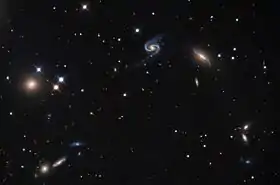NGC 91
NGC 91 (PGC 3325956, GC 41, GC 5097, or NPD 68 22.9) is a star with an apparent magnitude of 14.4 in the constellation of Andromeda. The star is southwest of the galaxy NGC 90. Discovered in 1866 by Herman Schultz, there have been many arguments if this star exists or not. However, people have observed the star, and have confirmed that NGC 91 exists.[2]
| Observation data Epoch J2000 Equinox J2000 | |
|---|---|
| Constellation | Andromeda |
| Right ascension | 00h 21m 51.633s[1] |
| Declination | +22° 22′ 05.52″[1] |
| Apparent magnitude (V) | 14.4[2] |
| Astrometry | |
| Parallax (π) | 0.4985 ± 0.0399[3] mas |
| Distance | 6,500 ± 500 ly (2,000 ± 200 pc) |
| Other designations | |
| Database references | |
| SIMBAD | data |
References
- Cutri, R. M.; et al. (2003). "2MASS All-Sky Catalog of Point Sources". VizieR On-line Data Catalog. Bibcode:2003yCat.2246....0C.
- Seligman, Courtney. "Celestial Atlas NGC Objects: NGC 91". Celestial Atlas. Retrieved 23 May 2015.
- Brown, A. G. A.; et al. (Gaia collaboration) (August 2018). "Gaia Data Release 2: Summary of the contents and survey properties". Astronomy & Astrophysics. 616. A1. arXiv:1804.09365. Bibcode:2018A&A...616A...1G. doi:10.1051/0004-6361/201833051. Gaia DR2 record for this source at VizieR.
- "2MASS J00215163+2222055". SIMBAD. Centre de données astronomiques de Strasbourg. Retrieved 14 May 2017.
This article is issued from Wikipedia. The text is licensed under Creative Commons - Attribution - Sharealike. Additional terms may apply for the media files.
